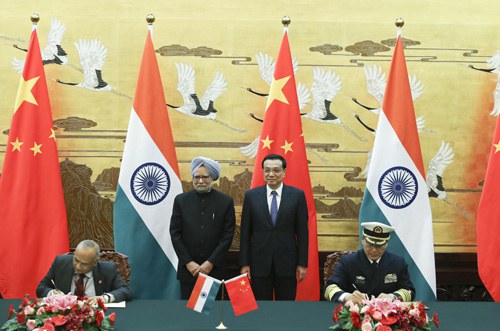|
 |
|
TRADE MATTERS: Chinese Premier Li Keqiang (right) and visiting Indian Prime Minister Manmohan Singh (center) attend a signing ceremony of bilateral cooperative contracts in Beijing on October 23 (DING LIN) |
President Xi and Premier Li Keqiang proposed to establish a Silk Road economic belt, a maritime Silk Road for the 21st century, as well as a Bangladesh-China-India-Myanmar economic corridor respectively during their trip to neighboring countries.
Qu said the proposals have covered operable and concrete cooperation on politics, the economy, finance and security. Moreover, the proposals could promote regional integration, trade and investment, generating a win-win result for all regional countries.
One of the highlights of the recent diplomatic work conference is the participation of representatives from financial institutions and big enterprises, which demonstrates the importance of economic and trade activities in China's diplomacy. A striking example was seen during Premier Li's recent Southeast Asia trip, during which he played the role of a spokesman for China's high speed railway technology in Thailand. In late October, trade ministers from Southeast Asian countries took a test ride of China's high speed railway from Shanghai to Beijing when they visited China.
President Xi proposed a three-dimensional, multi-element perspective when engaging with neighboring countries at the APEC economic leaders' meeting in October.
It serves as a guiding principle for China's diplomacy with its neighbors for the next five to 10 years, said Qu.
Xi also called on all parties to seek common ground and converging interests, cherish friendship and righteousness, and said that China will offer more assistance to developing countries within China's capacity. He emphasized that the basic tenet of diplomacy with neighbors is to treat them as partners, to make them feel safe and to help them grow.
Jin of the Renmin University remarked that China's new leadership has actually been taking the approach of "friendship first, disputes later" when working with its neighbors. Therefore, it is very likely to gain a positive response from them.
"China's foreign policy has generally aimed to put major power relations on an equal footing with those of surrounding countries; however, in practice the diplomatic practices have tended to focus heavily on major powers while leaving policies related to China's neighbors on the periphery. The recent diplomatic conference has sent a signal that China will truly attach equal importance to its neighborhood diplomacy and its diplomacy with major powers in the future," said Professor Jin.
Email us at: yulintao@bjreview.com
| 